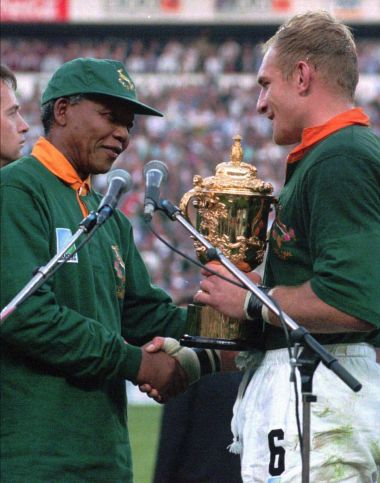The lessons Christians can learn from Mandela

I cannot be certain Nelson Mandela was a Christian but that has to be true of everyone I meet. Only God knows those who are His. But I have to admit there was so much to admire in the way he approached life. And I reckon he can teach a valuable lesson in mission too.
Mandela was clearly a very thoughtful man. His reactions were deliberate and shaped by conviction rather than emotion and prejudice. This is seen so clearly in his decision to learn Afrikaans in an effort to get close to his jailers. It was a decision that was to have the most amazing consequences too as a leader in the Sunday Times showed when it suggested he had saved his country from a bloodbath three years after his release, and prior to his election as President Mandela, when he was warned that there were some 100,000 die-hard Afrikanners ready for war.
It was then that he revisited the lessons he had learned while watching his prison warders and as a consequence he invited the insurrectionary leaders to talk. Incredibly Mandela served them tea, pouring it himself and praising their virtues in Afrikaans while criticising the injustices of apartheid. It was behaviour that was to prompt General Constand Viljoen to declare that Mandela was "the greatest of men".
As I read and re-read these stories of Mandela I can't help but compare his approach with that of Jesus. He had a clear strategy and was prepared to give his all to achieve it. But he ensured its success by making the effort to get close to people, people who were distrustful of him and people who at times even despised him. He learned their language and won their hearts as a precursor to winning their minds.
This is what incarnational mission is all about. It involves risk. It requires a willingness to get involved in other people's lives whatever they think of us, and whatever they may have done to us in the past. It challenges us to leave the comfort of our Christian space and to give time and energy to others in the prayerful hope that we will win a hearing for our arguments. It can often involve entering their thought worlds, but it will also mean entering their heart worlds so that we learn to weep with those who weep and feel the pain of those who are in huge need.
As Matthew Barnet Pastor, of the Dream Centre in Los Angeles writes, "We serve a God who showed us how to put Himself in another's world. He always looked for ways to serve others."
He continues, "When you put yourself in another man's world you learn how to have vision."
Vision is birthed out of a sense need. Mandela understood this. He seems to have possessed an extraordinary sense of empathy with those he dealt with.
John Carlin again: "He internalised his enemies' fears and aspirations, made plain to them that he understood them and, being able to imagine himself in their skin, managed to win gratitude and esteem while positioning himself to hold the upper hand in negotiations."
It's become obvious to me that Nelson Mandela had a profound respect for people too. He was not fazed by royalty and not dismissive of anyone whatever their status or station in life. In living this way he mirrored the one who created him, and I pray, has also saved him. If we have a respect for them we too will make the effort to get to know them, to understand them and to care for them in the hope that we can win their hearts and minds too.
As Lyndon Bowring observed in a recent CARE newsletter, "Although in our increasingly secular culture religious faith is being pushed to the margins of society no one can stop the Church from demonstrating Christ's compassion.
"Indeed, we might argue this is the very moment when the Church might well seize its opportunity to show our increasingly self-centred culture what true compassion is really like."











